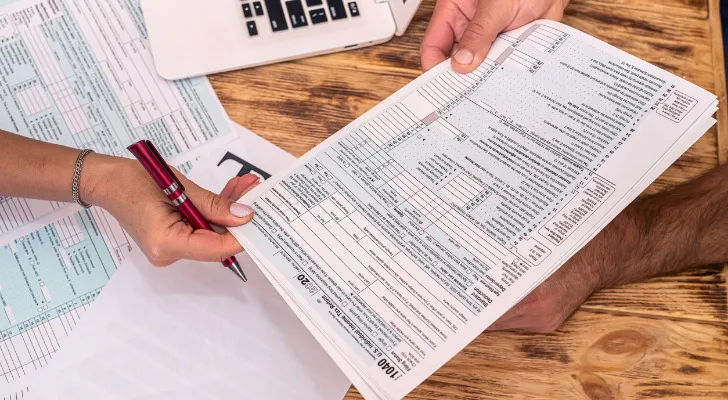When comparing a tax preparer vs. CPA, it all comes down to expertise and services offered. Tax preparers, including those at retail tax firms, focus on filing returns and may not hold advanced credentials. Certified public accountants (CPAs), on the other hand, must meet rigorous education and licensing requirements, allowing them to provide tax planning, financial analysis and audit representation. While both can assist with tax filing, a CPA offers broader financial expertise that extends beyond tax season.
For help with both taxes and other financial considerations, consider working with a financial advisor.
What Is a Certified Public Accountant?

A certified public accountant (CPA) is a licensed financial professional who provides accounting, tax and advisory services. The CPA credential is administered by American Institute of Certified Public Accountants but issued by individual state boards of accountancy.
CPA Licensing Requirements
To become a CPA, an accountant must meet both national and state requirements. At the national level, candidates must pass the Uniform CPA Exam, a standardized test covering auditing, financial accounting, business concepts, and regulations.
In addition to the exam, each state sets its own licensing criteria. These state-specific requirements can be found on the AICPA’s website or the National Association of State Boards of Accountancy (NASBA). Some states allow CPAs with extensive experience to waive certain requirements, such as residency rules, to facilitate career mobility.
For example, in New York, CPA candidates must:
- Be at least 21 years old.
- Complete 150 credit hours of post-secondary education, including 33 accounting-related credits and 36 business-related credits. Alternatively, 15 years of supervised experience may be substituted for the education requirement.
- Gain at least one year of relevant work experience.
Most states require candidates to complete 150 semester hours of coursework, typically as part of a bachelor’s or master’s degree in accounting or business. Many states also mandate a period of supervised professional experience, usually one to two years under a licensed CPA. Some states require candidates to pass an ethics exam to assess professional integrity, and residency or mobility rules may apply depending on where they plan to practice.
What Is a Tax Preparer?

A tax preparer is a professional who assists individuals and businesses with filing tax returns. Tax preparers can range from unenrolled tax professionals at retail tax firms to federally authorized enrolled agents (EAs) with specialized tax expertise.
The enrolled agent designation is a professional credential granted by the IRS to individuals who meet two requirements.
- They have taken and passed the Special Enrollment Examination of the IRS;
- They continue to meet the IRS continuing education requirements by taking at least 72 hours of continuing education every three years, with at least 16 hours every year.
Enrolled agents are certified to prepare your taxes and apply the tax code to your specific financial situation. Like a CPA, an enrolled agent is authorized to sign and file tax returns on behalf of clients.
However, tax preparers typically focus on tax return preparation rather than broader financial planning or accounting. A tax preparer is not necessarily qualified to advise you on general accounting and financial questions, nor are they necessarily qualified to help you manage your tax situation before it’s time to file. Their expertise is narrow and specific: They can tell you what you owe or are owed on April 15. Many tax preparers are also accountants, investment advisors or financial professionals in other capacities.
A tax preparer may be the right choice if you have questions specifically about preparing or filing your taxes. If you want to maximize potential deductions or put your mind at ease during tax season, a tax preparer may be the right choice. If you have a generally clear understanding of your complex finances but need assistance with tax filing, a tax preparer might be the right choice. They can make sure that you follow the rules and don’t miss anything.
When to Hire a CPA vs. Tax Preparer
Choosing between a CPA and a tax preparer depends on the complexity of your financial situation. A tax preparer is typically a good choice for individuals with straightforward tax returns. If your income comes primarily from wages, you take standard deductions or you only need help filing annual tax returns, a tax preparer can efficiently and affordably handle your needs.
A CPA can be beneficial for individuals and businesses dealing with complex financial matters. Those managing large assets, multiple income sources or business operations may benefit from year-round accounting and strategic tax planning. CPAs assist with financial statements, audits, tax compliance and estate planning, making them valuable for high-net-worth individuals, self-employed professionals and anyone with multi-state or international tax considerations.
For tax-related needs, CPAs and EAs are both qualified to handle these tax-specific issues. While tax preparers handle annual filings, a CPA or EA can provide broader financial and advisory services tailored to long-term financial health.
Bottom Line
A CPA is a full-service accounting professional who is generally better suited to provide year-round accounting services and tax planning. A tax preparer is someone who is licensed to prepare and file taxes, and is generally the right choice for someone who specifically needs help when it comes time to file.
Tax Tips
- If you have complicated finances you might need a CPA. If you have very complicated finances, you might need a tax attorney. Read on to learn all about the difference.
- A financial advisor will help you with taxes and with other financial questions. Finding a financial advisor doesn’t have to be hard. SmartAsset’s free tool matches you with financial advisors who serve your area, and you can have a free introductory call with your advisor matches to decide which one you feel is right for you. If you’re ready to find an advisor who can help you achieve your financial goals, get started now.
Photo credit: ©iStock.com/PeopleImages, ©iStock.com/alfexe, ©iStock.com/fizkes
